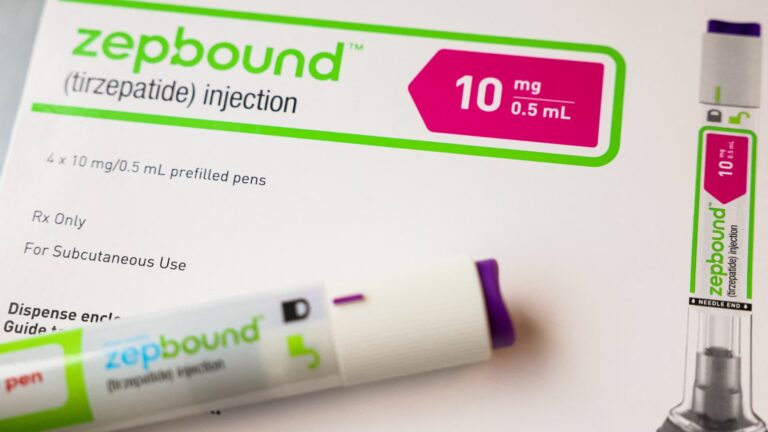Eli Lilly The company said Friday it has filed for U.S. approval of its weight-loss drug Zepbound to treat the most common sleep-related breathing disorder and expects regulators to give the go-ahead. decide As early as the end of the year.
If approved by the Food and Drug Administration, the company plans to launch Zepbound, a treatment for so-called obstructive sleep apnea, “as soon as possible,” in early 2025, Patrick Johnson, president of Eli Lilly’s diabetes and obesity unit, said in an interview.
The company also announced Friday additional data from two late-stage clinical trials showing that Zepbound was effective in improving symptoms of obstructive sleep apnea (OSA) in nearly half of patients. American Diabetes Association 84th Scientific Meeting Friday in Orlando, Florida.
“We’re very excited. … I think this actually exceeds the expectations of most outside experts,” Johnson said of the new data showing Zepbound can help resolve some patients’ disorders.
This adds to growing evidence that there may be additional health benefits for the weight-loss and diabetes drug that has surged in popularity and become in short supply over the past year in the U.S. The data also paves the way for Eli Lilly to gain broader insurance coverage for Zepbound, which, like other weight-loss drugs, is not covered by many insurance plans.
The pharmaceutical giant released early results from two studies in April showing that Zepbound was more effective than a placebo in reducing the severity of OSA in obese patients after one year.
OSA is a condition in which breathing stops during sleep due to a narrowed or blocked airway. An estimated 80 million people in the U.S. have the condition, Eli Lilly said in a press release. Of those, about 20 million have moderate to severe disease, Johnson said, but 85 percent of OSA cases go undiagnosed.
OSA not only causes loud snoring and excessive daytime sleepiness, but can also lead to serious complications such as stroke and heart failure. Patients with the disease have limited treatment options beyond wearing a mask attached to a cumbersome device. machine It provides positive airway pressure (PAP) to help you breathe normally while you sleep.
The first study tested weekly injections in adults with moderate to severe OSA and obesity who were not receiving PAP therapy, while the second trial tested Zepbound in adults with the same condition, but these patients were receiving and planned to continue receiving PAP therapy.
According to the announcement, the new results showed that 43 percent of subjects in the first study who took the highest dose of Zepbound and 51.5 percent of patients in the second trial achieved “cure of the disease,” compared with 14.9 percent and 13.6 percent, respectively, of patients who took a placebo in the two trials.
“This has a huge impact on patients’ lives,” Leonard Glass, senior vice president of medical affairs for diabetes and obesity at Eli Lilly, told CNBC. “Imagine not having to use a PAP machine, not having to worry about waking up again in the middle of the night, not having to live with someone who has this disease for your partner.”
The researchers are so-called Apnea-hypopnea indexThe ACHI, or Obstructive Sleep Apnea Index, records how many times per hour a person’s airway narrows or becomes completely blocked while breathing. The index is used to assess the severity of obstructive sleep apnea and the effectiveness of treatments for the condition.
According to Eli Lilly, disease cure for OSA is defined as a patient having fewer than five AHI events per hour. Cure is also defined as having between five and 14 AHI events per hour and achieving a specific number on a standardized survey designed to measure excessive daytime sleepiness.
Among other new data, the company said 62.3% of patients taking Zepbound in the first trial experienced a 50% or greater reduction in AHI events, compared with 19.2% of patients taking a placebo, while 74.3% of people taking Eli Lilly’s drug in the second trial experienced a 50% or greater reduction in AHI, compared with 22.9% of participants taking a placebo.
Eli Lilly reiterated on Friday that Zepbound met the trial’s primary goal of reducing AHI events.
Zepbound resulted in an average reduction in AHI events of 27.4 events per hour over 52 weeks in people who were not using PAP machines, compared with an average reduction of 4.8 events per hour in people who received a placebo in the first trial.
The drug also reduced AHI events by an average of 30.4 events per hour at 52 weeks in patients using PAP machines, compared with an average of 6 events per hour in people taking a placebo in the second study.
Eli Lilly previously announced the FDA’s approval of Zepbound. “Fast track designation” For patients with moderate to severe OSA and obesity. This designation allows for more expedited review of medicines intended to both treat serious or life-threatening conditions and fill unmet medical needs.


